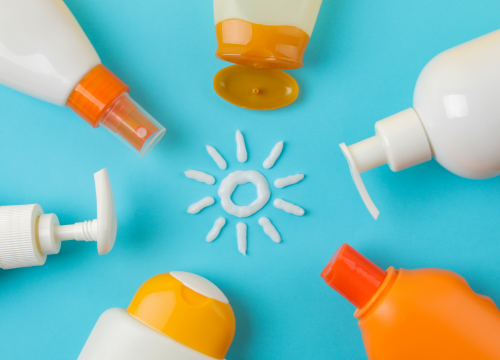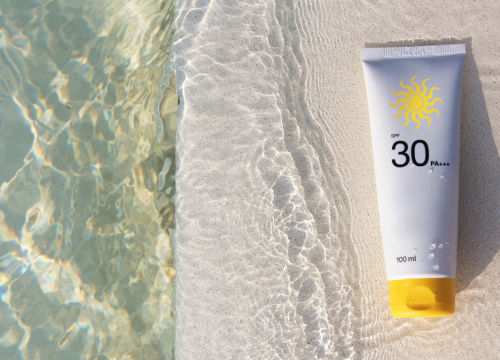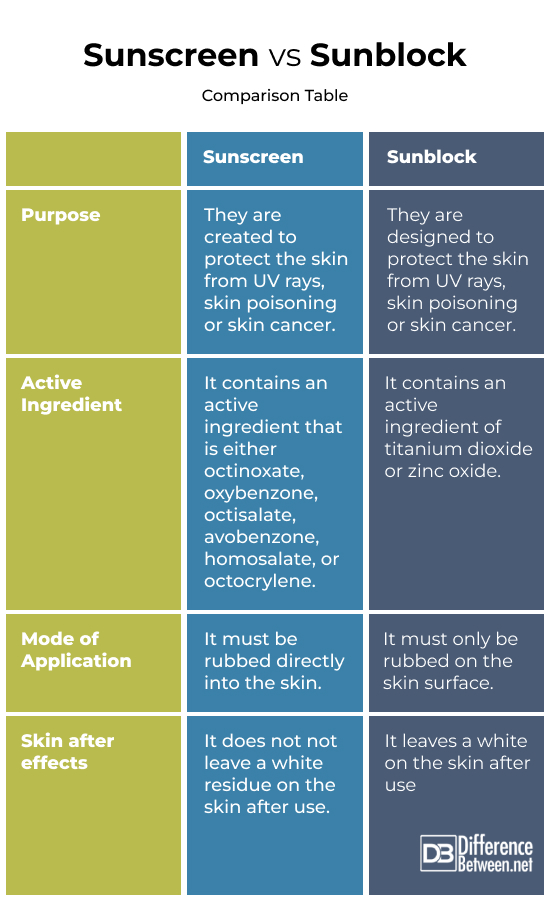Difference Between Sunscreen and Sunblock
If you’re looking to protect yourself from ultraviolet radiation from the sun, there are two alternatives to try – sunscreen and sunblock. While both sound alike and have a similar purpose, they work differently. Hence you need to clearly distinguish between them. That’s where we come in. This article highlights the similarities and differences between sunscreen and sunblock.

What is Sunscreen?
Like the name implies, sunscreen works to screen the skin from incoming UV rays. This whitish fluid turns transparent when rubbed into the skin. The best sunscreens are those that protect against UV-A and UV-B rays. It’s important to note that the active ingredient in sunscreen is octinoxate, oxybenzone, octisalate, avobenzone, homosalate, or octocrylene.

What is Sunblock?
Unlike sunscreen, sunblock blocks out UV rays by reflecting them from the skin surface. They are also called physical sunscreens. Most sunblocks are made from titanium dioxide and zinc oxide. This is why these products have a considerably thicker appearance. Because of the physical properties of sunblocks, certain people may struggle to spread it on their body. It’s also considerably easier to notice when applied on the skin.
Possible Similarities Between Sunscreen and Sunblock
There are a few similarities between sunscreen and sunblock, and it’s almost easy to ignore them. They include:
- Sunscreen and sunblock are both designed to protect the skin from UV radiation, and any skin diseases associated with overexposure.
- While the method of application may differ slightly, both products are used on the skin surface.
- Both sunscreen and sunblock have a whitish appearance.
What is the Difference Between Sunscreen and Sunblock?
There are a few notable differences between sunscreen and sunblock, starting from the manner of application to avoid UV radiation. Sunscreen only works when it’s absorbed into the skin. As a result, you may need to rub it. Often, it’s recommended to rub sunscreen till it changes from white to transparent. When applied correctly, sunscreen leaves no white residue on the skin.
On the other hand, sunblocks are used to cover the skin. So, you don’t have to struggle to rub it in. However, you’ll need to cover all parts of your body evenly. Leaving just a small patch of skin exposed may result in a sunburn. Because of its application method, sunblocks leave a white residue on the skin surface.
Furthermore, there’s a higher risk of side effects with sunscreens than sunblocks. Why? Sunscreens are absorbed into the skin and may easily irritate its layers. Additionally, sunscreens may also contain oil and fragrances that may cause acne.
Sunscreen vs. Sunblock: Comparison Table

Summary
When you look at the underlying concept behind the creation of sunscreen and sunblock, it’s clear that they are similar. However, both are made from distinct ingredients. They are also applied differently with sunblock serving as an extra protective layer to the skin. Unless you have an allergy, you’re free to use either product – sunscreen or sunblock. However, church the labels of each product to determine what type of radiation they protect against and whether they are water-resistant.
FAQs
Which one is better sunscreen or sunblock?
Both types of sun protection have their merits and demerits. You’re left to decide which of them is more comfortable on your skin.
Is it okay to use sunblock everyday?
Unless you’re living in a region with intense heat and sunlight, there’s no reasons to use sunblock everyday.
Can I put sunblock on my face?
Yes, you can apply sunblock on your face. The goal of using sunblock is to cover all parts of the body exposed to the sun to prevent drying up or sunburns.
Can I use sunblock and sunscreen at the same time?
Both sunscreen and sunblock serve the same function. So, it makes no sense to use both of them at the same time.
Which one to apply first: sunscreen or moisturizer?
It’s clinically recommended that people should apply a moisturizer before sunscreen. The moisturizer will prepare the skin surface for contact with the sunscreen.
Is it OK to apply sunscreen without moisturizer?
Yes, you can apply sunscreen without moisturizer. However, it’s clinically recommended not to skip this process because it can leave your skin prone to damage over the long term.
What are the best sunscreens for adults in Canada and the USA?
There are several top sunscreen alternatives for adults in Canada and the United States. If you’re having a hard time choosing one, speak to a dermatologist.
What are the best sunscreens for kids in Canada and the USA?
You’ll find several sunscreen alternatives for kids in Canada and the United States. To settle on the best choice, research several alternatives. Ensure to consider their water and radiation resistance.
What is a natural sunscreen and where can I buy them?
Natural sunscreens refer to products that are made from organic substances, rather than chemical compounds. It also refers to naturally occurring items, such as shea butter, carrot seed oil and sesame oil, that can substitute for regular sunscreens. There’s a seperate market for natural sunscreens and you can find several alternatives online.
What sunscreen do doctors recommend?
Medical practitioners often recommend sunscreen with the capacity to shield UV-A and UV-B radiation. You can discover the shielding capacity of any particular product by reading its labeling.
- Difference Between Schizophrenia and Psychosis - March 7, 2024
- Difference Between African and Asian Elephants - March 7, 2024
- Difference Between Sunscreen and Sunblock - February 15, 2024
Search DifferenceBetween.net :
Leave a Response
References :
[0]Image credit: https://www.canva.com/photos/MAEhegdOwhU-bottles-of-sunscreen/
[1]Image credit: https://www.canva.com/photos/MADatGFZSK0-summer-yellow-sunblock-cream-in-blue-outdoor-swimming-pool/
[2]Sander, M., Sander, M., Burbidge, T., & Beecker, J. (2020). The Efficacy and Safety of Sunscreen Use for the Prevention of Skin Cancer. Canadian Medical Association Journal, 192(50), E1802–E1808. https://doi.org/10.1503/cmaj.201085
[3]Abraham, A., & Kaimal, S. (2011). Sunscreens. Indian Journal of Dermatology, Venereology, and Leprology, 77(2), 238. https://doi.org/10.4103/0378-6323.77480
[4]Frothingham, S. (2019, April 16). Sunscreen vs. Sunblock: Which One Should I Use? Healthline; Healthline Media. https://www.healthline.com/health/sunscreen-vs-sunblock#spf
